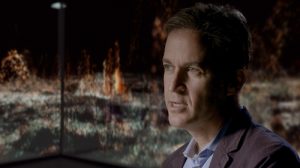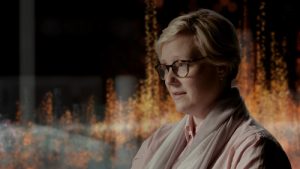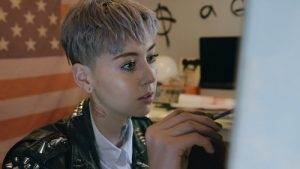Communiqué
“The Cleaners” on Independent Lens | November 12
< < Back to the-cleaners-on-independent-lens-november-12The Cleaners Premieres on Independent Lens Monday, November 12, 2018
Explore the Hidden, Shadowy World of Digital Cleaning by Silicon Valley’s Content Moderators
Online Streaming Begins November 13
“Fake news.” Violent pornography. Terrorist propaganda. Everyone agrees that the initial dream of the internet as a utopian global community has evolved into something much more sinister. Silicon Valley leaders and lawmakers have taken steps to remove some of the internet’s most hateful sites and content, but who actually sifts through the net and removes them? The Cleaners looks at five digital cleaners or “content moderators” – young people in an outsourced post in the Philippines who spend each day scanning the net and deciding what to keep and what to delete. Directed by Hans Block and Moritz Riesewieck, The Cleaners premieres on Independent Lens Monday, November 12, 2018, 10:00-11:30 PM on WOUB.
 At their inception, social media networks like Facebook, YouTube and Twitter claimed to be creating a boundless, borderless community where unfettered communication would lead to greater freedom and understanding. But the universal pervasiveness of these sites also affords an easy platform for those seeking to spread something more than just snapshots of their vacation. Misleading facts posing as news, unsettling images, and radical opinions are now so rampant on social media that they are shaping elections, worsening political divides and sparking sporadic acts of violence around the world.
At their inception, social media networks like Facebook, YouTube and Twitter claimed to be creating a boundless, borderless community where unfettered communication would lead to greater freedom and understanding. But the universal pervasiveness of these sites also affords an easy platform for those seeking to spread something more than just snapshots of their vacation. Misleading facts posing as news, unsettling images, and radical opinions are now so rampant on social media that they are shaping elections, worsening political divides and sparking sporadic acts of violence around the world.
Through interviews with Silicon Valley leaders, The Cleaners reveals the industry’s little-known secret: a set of rules, criteria and processes by which these companies monitor the material posted to their sites — a job carried out by people known as “content moderators.” And while the policies on what constitutes permissible content are written in Silicon Valley, the global headquarters for content moderation is in the city of Manila in the Philippines. There, a vast army of young people are employed as “digital scavengers,” moderating thousands upon thousands of troubling images and videos during the course of a ten-hour shift.
The Cleaners delves into the lives of five of these content moderators, uncovering the reality of their often-traumatic work. While most people agree that the most troubling of these images should be removed, some of the deleted pictures include legitimate artistic expression as well as documentation of actual events in places cut off from the media. Featured are activists whose images have been removed, including organizations documenting war crimes in Syria and Myanmar.
So what’s the solution? Is it possible for social media to return to its utopian ideal? How can we make sure that we penalize those who spread lies, hate and violence without censoring those whose aim is to share art, opinions or expose under-reported news? And, most importantly, who decides which is which?
“Eighty-one percent of adult Americans use the internet and almost three-quarters of these regularly use Facebook. The Cleaners tells the little-known story of how Facebook, Google and other online portals monitor the content they distribute, which has an enormous effect on what we see and think,” said Lois Vossen, Independent Lens executive producer. “In a time of ‘fake news,’ partisan tensions and eroding trust, The Cleaners sheds essential light on how Silicon Valley controls what we see — decisions that can alter our opinions, our values and our political climate.”
Nicole Wong is an attorney specializing in Internet, media and intellectual property law. She served as Vice President and Deputy General Counsel at Google and Legal Director of Products at Twitter. She also served in the Obama administration as White House deputy chief technology officer (CTO).
Antonio Garcia Martinez is a former product manager for Facebook and author of Chaos Monkeys: Obscene Fortune and Random Failure in Silicon Valley (2016), an autobiography that details his experiences with launching a tech startup, selling it to Twitter, and working at Facebook from its pre-IPO stage.
Tristan Harris spent three years as a Google Design Ethicist, developing a framework for how technology should “ethically” steer the thoughts and actions of billions of people from screens.
In 2016, he left Google to work on reforming the attention economy with the non-profit initiative Time Well Spent, which “aims to catalyze a rapid, coordinated change among technology companies through public advocacy, the development of ethical design standards, design education and policy recommendations to protect minds from nefarious manipulation.”
Illma Gore is Los Angeles-based artist whose work was banned from Facebook in 2016 after she posted a painting depicting a nude Donald Trump.
Abdulwahab Tahhan is a Syrian working for the non-profit project AIRWARS in London which helps to track down and archive photos and videos of the war in Syria that are uploaded onto
social media sites like YouTube. These war documents are often deleted because they depict violence.
Khaled Barakeh is a Syrian photographer and visual artist living and working in Berlin. Hoping to
raise awareness of the horrors of the Syrian war, he has posted photographs of dead refugee children who were killed during the war or on their flight from Syria. These pictures were deleted from Facebook.
 Yaman Akdeniz is a specialist in digital law at the Bilgi University in Istanbul, the founder and director of Cyber-Rights.Org, and the co-founder of BilgiEdinmeHakki.org, a group working in the field of freedom of information law in Turkey.
Yaman Akdeniz is a specialist in digital law at the Bilgi University in Istanbul, the founder and director of Cyber-Rights.Org, and the co-founder of BilgiEdinmeHakki.org, a group working in the field of freedom of information law in Turkey.
Sabo is a right-wing street artist and activist based in Los Angeles.
Nay San Lwin is a Rohingya activist and blogger.
Sarah T. Roberts is Assistant Professor in the Department of Information Studies at UCLA. Her work focuses on information labor and laborers, particularly in the digital context, with special emphasis focused on the practice and practitioners of Commercial Content Moderation (CCM), a term she coined.
David Kaye is UN Special Commissioner for Freedom of Speech on the Internet.
About the Filmmakers
Hans Block (Co-Director) is a German theater director, filmmaker, and musician. He studied music (drums) at the University of Arts in Berlin and theater directing at Ernst Busch Academy of Dramatic Arts in Berlin. In 2014, Block became resident director and member of the Artistic Direction of the Box at Schauspiel Frankfurt. Productions there included “Mysterien – Unberechenbar werden” by Knut Hamsun, “Aufzeichnungen aus dem Kellerloch” by Fjodor Dostojewski and “Flankufuroto” by Bonn Park. In 2014, he was invited to the festival “Radikal Jung” at the Münchner Volkstheater with his production “Austrian Psycho,” which was awarded the Best Production Prize. His radio drama production “Don Don Don Quijote – Attackéee” was awarded best production of Prix Marulić 2015. Hans Block and Moritz Riesewieck work collaboratively under the label “Laokoon,” named after the legendary Trojan seer Laocoön who revealed the Trojan Horse as a dangerous fraud. In their works, Riesewieck and Block aim to reveal the Trojan horses of our time.
Moritz Riesewieck (Co-Director) is a German essayist, scriptwriter, theater and film director. He studied theater directing at Ernst Busch Academy of Dramatic Arts in Berlin. He previously studied economics as a fellow of the German Academic Scholarship Foundation and worked as assistant director at Schaubuehne am Lehniner Platz in Berlin. In 2014, he staged “Woyzeck” by Georg Buechner in Mexico City. His Spanish/German graduation production was invited to the renowned Heidelberg Play Market. In 2016, Riesewieck was granted the state of Berlin’s Elsa Neumann Scholarship for his innovative theater works, which were shown at festivals in Berlin and Hamburg and most recently at Theater Dortmund. In the same year, Riesewieck presented a lecture/performance about digital cleansing at re:publica Berlin and at Berliner Theatertreffen. His essay, “Digital Dirt Work,” was published by German publishing house dtv in September 2017.


